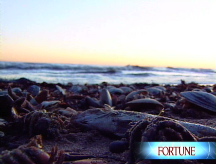Eco-police find new target: Oreos
Kraft Foods, Kellogg's and other U.S. food producers come under attack as demand for vegetable oil made from palm trees soars.

(Fortune) -- What do Oreo cookies made by Nabisco (KFT, Fortune 500), Cheez-It crackers from Kellogg's (K, Fortune 500) or General Mills' (GIS, Fortune 500) Fiber One Chewy Bars have to do with global warming and the destruction of tropical rainforests? A lot, say environmental activists.
The link between the supermarket shelf, climate change and shrinking rainforests is palm oil, a controversial ingredient that may now be the most widely-traded vegetable oil in the world.
Here's the problem: Demand for palm oil, which is found in soaps and cosmetics as well as food, has more than doubled in the last decade as worldwide food consumption has soared. Farmers, in turn, are expanding their plantations, burning forests in Indonesia and Malaysia, where nearly all of the palm oil imported to the United States originates. Deforestation is the primary reason that Indonesia's greenhouse gas emissions are the third-highest in the world.
The Rainforest Action Network, Greenpeace International, Friends of the Earth and the Center for Science in the Public Interest are all campaigning against palm oil. (You can find their arguments here and here and here and here.) Last week, RAN asked about 2,000 volunteers to sneak into food stores across the United States and attach stickers to products made with palm oil.
"Warning!," the stickers said. "May Contain Rainforest Destruction."
The targets of the RAN campaign are three global agricultural firms that grow or import palm oil: Archer Daniels Midland (ADM, Fortune 500), Cargill and Bunge (BG). The goal of last week's stunt was to get the attention of consumer-goods companies, who are being asked to look into their sourcing of palm oil.
"We're working our way down the food chain," explained Mike Brune, the executive director of RAN. "Most customers won't want rainforest destruction and climate change in every mouthful of cookies or crackers, so our plan is to start with the most prominent brands. Once we get some of the top brands on our side, we'll use the power of the pocketbook to convince the 'A,B,C's' (ADM, Bunge and Cargill) that destroying rainforests and increasing climate change isn't smart - for business or the planet."
The agribusiness companies say they are doing their best to buy palm oil that is produced with minimal harm to the environment. All are participants in a partnership, formed by the World Wildlife Fund and Unilever (UN), called the Roundtable on Sustainable Palm Oil, or RSPO, which is setting standards for palm-oil cultivation.
Said Mark Klein, a Cargill spokesman, by e-mail: "We are currently working towards having all of our company-owned plantations officially RSPO-certified as quickly as possible in 2008." You can read more about Cargill's position here.
The trouble is, critics say, the RSPO principles as they are now written are vague, don't prevent the destruction of rainforests, and are not well-enforced. What's more, only a handful of palm plantations have been certified to date by RSPO.
"There's currently no palm oil in the world that can be proven to be sustainable," said Leila Salazar-Lopez, who leads RAN's agribusiness campaign. The growing use of palm oil in biofuels has made the problem even more urgent.
Caught in the middle of the controversy are the consumer brands. A handful of companies have already made efforts to buy palm oil that is responsibly grown. The Body Shop says that it gets its palm oil from an organic producer in Colombia. Dr. Bronner's Magic Soaps, a small firm that makes organic soaps, says that it sources all of its palm oil from small growers in Ghana.
There's precedent for bigger brands to push their suppliers to do better. Several years ago, after Greenpeace attacked McDonald's (MCD, Fortune 500) for buying soy from the Amazon and contributing to deforestation, the fast-food giant persuaded Cargill and Bunge to stop buying soy from newly-cleared areas while the parties come up with a longer-term conservation plan, which is still in the works.
John Buchanan of Conservation International, which works with Bunge and Cargill, says those companies are trying to improve their practices. "I see them as part of the solution," he said. But he agrees with the Rainforest Action Network that buyers of palm oil need to more actively seek out responsible sources. "It's really important for the market to step up and create demand."
The World Wildlife Fund's Jason Clay, author of the an authoritative book called World Agriculture and the Environment, says that, instead of cutting and burning forests to make way for palm plantations, farmers should be encouraged to grow the crop on already cleared land.
"Global production could be doubled by planting palm trees on degraded areas of Borneo," Clay said. "The advantage is that not a tree would have to be cut." ![]()
-
 The retail giant tops the Fortune 500 for the second year in a row. Who else made the list? More
The retail giant tops the Fortune 500 for the second year in a row. Who else made the list? More -
 This group of companies is all about social networking to connect with their customers. More
This group of companies is all about social networking to connect with their customers. More -
 The fight over the cholesterol medication is keeping a generic version from hitting the market. More
The fight over the cholesterol medication is keeping a generic version from hitting the market. More -
 Bin Laden may be dead, but the terrorist group he led doesn't need his money. More
Bin Laden may be dead, but the terrorist group he led doesn't need his money. More -
 U.S. real estate might be a mess, but in other parts of the world, home prices are jumping. More
U.S. real estate might be a mess, but in other parts of the world, home prices are jumping. More -
 Libya's output is a fraction of global production, but it's crucial to the nation's economy. More
Libya's output is a fraction of global production, but it's crucial to the nation's economy. More -
 Once rates start to rise, things could get ugly fast for our neighbors to the north. More
Once rates start to rise, things could get ugly fast for our neighbors to the north. More









